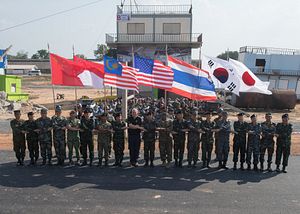The Trump administration’s engagement in Asia continued its upward momentum with the recent Cobra Gold military exercise. The 37th iteration of the annual exercise was conducted from February 13 to 23, 2018. Since the United States downplayed its relations with Thailand after the 2014 coup, the number of U.S. military personnel involved in the Cobra Gold military exercises has stood at around 3,600 annually. This year, the United States raised the number of military personnel to 6,800. In addition, the amphibious assault component was back after being excluded from the exercise’s scope since 2014.
To some observers, this may be narrowly seen as part of the re-establishment of U.S.-Thailand relations that started when President Donald Trump made a phone call to Thai Prime Minister Prayut Chan-o-cha to reaffirm the longstanding alliance. Trump subsequently hosted Prayut at the White House in October 2017. Many then got caught up in talks of a “new era” for the alliance. Following the conclusion of the latest Cobra Gold exercise, Thailand’s military government would now perhaps play up the country’s strategic importance and the willingness of the United States to engage them despite their political troubles.
However, this must not be taken as Washington’s full recognition of the coup and the military regime in Thailand. It does not reflect America’s abandonment of its own democratic values. In fact, the United States continues to reiterate the need for Thailand to return to democracy. Separately, although the United States and Thailand are cosponsors of the exercise, there are other key participating nations such as South Korea, Japan and Singapore. As such, it is more important to discuss the exercise beyond the U.S.-Thailand alliance and see it in the broader context of the United States strengthening security cooperation in Asia.
The United States’ Concerns and Engagement in Asia
The United States’ key concerns in Asia are the growing influence of China in the region, continued tensions in the South China Sea, and the intractable nuclear problem on the Korean Peninsula. In fact, under the 2017 National Security Strategy and the 2018 National Defense Strategy, the Trump administration has identified strategic competition with China in the Indo-Pacific region as one of its primary concerns.
In particular, the 2017 National Security Strategy has alleged that China aims to “displace” the United States and establish a Sino-centric order in the region through economic inducements, information operations and military coercion. The strategy paper was also highly critical of Chinese actions in the South China Sea, particularly on the Spratly Islands which endangers “the free flow of maritime trade, threatens the sovereignty of other nations and undermines regional stability.”
Therefore, Washington perceives it as is crucial to expand Indo-Pacific alliances and partnerships to form a security architecture capable of deterring aggression and maintaining stability. Closer defence cooperation entails stepping up arm sales to regional states and increasing the scale of military exercises including the Cobra Gold series. In doing so, the United States believes that it would be able to reassure allies and partners as well as counteract China’s growing influence in the region.
Besides the Chinese threat, the United States also sees the North Korean nuclear threat as a significant challenge. In this year’s Cobra Gold exercise, it is interesting to note that the South Korean marines were spearheading a combined amphibious assault exercise on Thailand’s Hat Yao Beach. Some observers have been quick to situate this in the context of persistent tensions in the Korean Peninsula. Regardless of the true intent of this arrangement, it goes to show that the Trump administration’s upscale of the Cobra Gold exercise has to be seen in light of broader foreign policy strategy rather than just the U.S.-Thailand alliance.
Much has been said about the Trump administration’s missteps in foreign policy. For instance, Trump has been accused of alienating European allies, engaging in a “war” on NAFTA and further destabilizing the Middle East with his announcement of Jerusalem as Israel’s capital. However, his engagement in Asia has brought about a growing momentum. Unlike the Obama administration, this administration has demonstrated a willingness to engage Southeast Asian leaders of different stripes. This indicates that the administration separates interests from values and sees the importance in remaining active in Asia.
Welcoming the United States’ Renewed Focus?
Some argue that Southeast Asia in particular should welcome Trump’s increasing military engagement in the region as a much-needed balance against China. Yet, some Southeast Asian states may be wary for fear of being wrongly perceived by China as participating in U.S.-led containment strategy. Separately, one should also know that China would respond in kind, with increasing arms sales and combined exercises of its own. A more competitive dynamic between the United States and China would definitely complicate the regional security environment. As the pressure goes up, Southeast Asian states may be forced to make certain hard decisions.
Eugene Mark is a Senior Analyst with the S. Rajaratnam School of International Studies in Singapore.
































